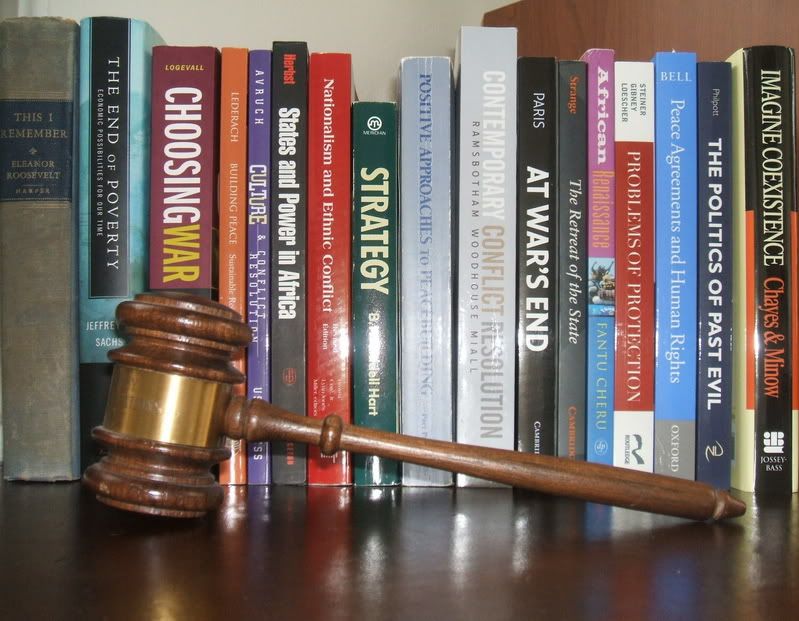Cease-fire in Korea lives on
Back in the dark ages of my youth (read: about three years ago), I wrote up a paper analyzing why it took more than two years of wrangling to get a cease-fire drawn up to end the Korean War. That document was signed, finally, 55 years ago today, but the process had begun -- initiated by the Soviets, ironically -- in 1951 before the conflict was even a year old.
The standard argument I found at the time (read this for a good example, I have yet to read a more recent account that may find otherwise) was that negotiating over the exchange of prisoners of war was an exceptionally contentious point. Generally, POW exchanges are all-for-all, but it was well known that North Korean and Chinese forces had impressed men into service during both of their major advances into the South, and those on the United Nations side thought it would be improper to return combatants to a country that had not willingly fought for. A rather elaborate evaluation scheme was eventually set up, though it was never carried out quite properly. Anyhow, that score settled, the fighting could be ended. Or so the story goes.
My thesis, though, is that the domestic political situation within the U.S. slow eddown the talks. President Truman and his State Department were on the defensive against Senator Joseph McCarthy's rampant accusations of communist infiltration in the government. After the "fall" of China in the late 1940s, State's East Asia bureau came under particular assault. Militarily speaking, an end to the Korean War that maintained the status quo antebellum was about the best that could be hoped for, as Chinese forces dramatically outnumbered UN forces, in spite of the latter's technical superiority. Without going nuclear, stalemate was about the best that could be acheived. But Truman and his crew realized that by throwing in the towel, they would be seen as being weak on communism at a time when that was a politically lethal charge. They raised the prisoner of war issue, then, as firm stance against returning "free" people (Syngmhan Rhee's South Korea was hardly unoppressive) to the "slavery" of the communist North.
Immediately after his election to the presidency, Dwight D. Eisenhower took a pre-inauguration trip to Korea to meet with commanders and see the situation for himself. His belief that the war needed to end was confirmed by the trip, and he said so publicly, which infuriated Truman. By early 1953, too, McCarthy was losing influence, and Eisenhower made it clear to the Senator that as President, he would tolerate no baseless attacks on his administration. Thus with Eisenhower's ascent, the political space was created to actually sign a deal (various drafts similar to the final piece had circulated for some time).
Of course, the "political parley" to take place following the cease-fire never ocurred, and on paper anyway, the official war continues, the demilitarized zone is still enforced, and fighting could theoretically resume at a moment's notice. There are positive signs, though, that progress can be made, as sustainable peace (contrary to some observers) this most definitely is not.
The standard argument I found at the time (read this for a good example, I have yet to read a more recent account that may find otherwise) was that negotiating over the exchange of prisoners of war was an exceptionally contentious point. Generally, POW exchanges are all-for-all, but it was well known that North Korean and Chinese forces had impressed men into service during both of their major advances into the South, and those on the United Nations side thought it would be improper to return combatants to a country that had not willingly fought for. A rather elaborate evaluation scheme was eventually set up, though it was never carried out quite properly. Anyhow, that score settled, the fighting could be ended. Or so the story goes.
My thesis, though, is that the domestic political situation within the U.S. slow eddown the talks. President Truman and his State Department were on the defensive against Senator Joseph McCarthy's rampant accusations of communist infiltration in the government. After the "fall" of China in the late 1940s, State's East Asia bureau came under particular assault. Militarily speaking, an end to the Korean War that maintained the status quo antebellum was about the best that could be hoped for, as Chinese forces dramatically outnumbered UN forces, in spite of the latter's technical superiority. Without going nuclear, stalemate was about the best that could be acheived. But Truman and his crew realized that by throwing in the towel, they would be seen as being weak on communism at a time when that was a politically lethal charge. They raised the prisoner of war issue, then, as firm stance against returning "free" people (Syngmhan Rhee's South Korea was hardly unoppressive) to the "slavery" of the communist North.
Immediately after his election to the presidency, Dwight D. Eisenhower took a pre-inauguration trip to Korea to meet with commanders and see the situation for himself. His belief that the war needed to end was confirmed by the trip, and he said so publicly, which infuriated Truman. By early 1953, too, McCarthy was losing influence, and Eisenhower made it clear to the Senator that as President, he would tolerate no baseless attacks on his administration. Thus with Eisenhower's ascent, the political space was created to actually sign a deal (various drafts similar to the final piece had circulated for some time).
Of course, the "political parley" to take place following the cease-fire never ocurred, and on paper anyway, the official war continues, the demilitarized zone is still enforced, and fighting could theoretically resume at a moment's notice. There are positive signs, though, that progress can be made, as sustainable peace (contrary to some observers) this most definitely is not.





No comments:
Post a Comment